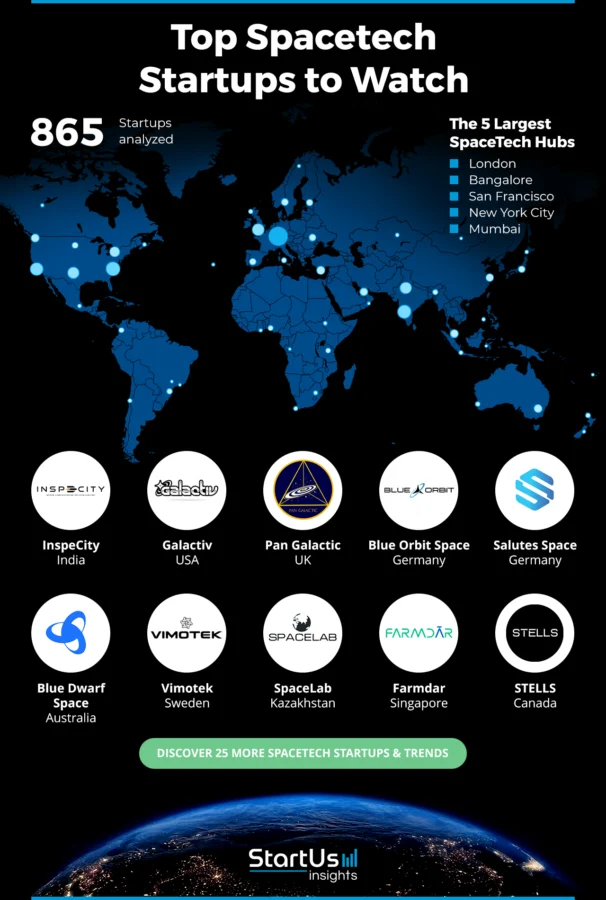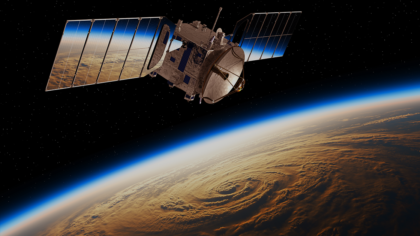Space technology companies are advancing exploration, driven by innovation and the need for high-performance solutions beyond Earth. SpaceTech is shaping the future with electric thrusters, AI systems, compliance tools, and mobile power rovers for orbital use.
This report highlights 10 space technology companies to watch in 2025, using imaging, propulsion, and IoT to unlock new missions. They enable satellite servicing, quantum-secure systems, and crop monitoring from orbit. This supports defense, commercial, and sustainability goals.
Global Startup Heat Map highlights Emerging Space Technology Companies to Watch
Through the Big Data & Artificial Intelligence (AI)-powered StartUs Insights Discovery Platform, covering over 7M+ startups, 20K+ technology trends plus 150M+ patents, news articles & market reports, we identified 860+ space tech startups.
The Global Startup Heat Map below highlights the 10 space technology companies you should watch in 2025 as well as the geo-distribution of 860+ startups & scaleups we analyzed for this research.
According to our data, we observe high startup activity in the US and India, followed by the UK. The top 5 Startup Hubs for space technology are London, Bangalore, San Francisco, New York City, and Mumbai.

Discover Emerging Space Technology Companies to Watch in 2025
We hand-picked startups to showcase in this report by filtering for their technology, founding year, location, funding, and other metrics. These spacetech startups work on solutions ranging from green propulsion and electric thrusters to space-ready AI and crop monitoring.
- InspeCity – Green Propulsion
- Galactiv – Spacecraft Servicing Platform
- Pan Galactic – Quantum Secure Operating System
- Blue Orbit Space – Electric Thrusters
- Salutes Space – Space-ready AI
- Blue Dwarf Space – Regulatory Compliance Platform
- Vimotek – Multispectral Smart Cameras
- SpaceLab – Satellite-Internet-of-Very-Important-Things
- Farmdar – Crop Monitoring
- STELLS – Mobile Power Rover
1. InspeCity
- Founding Year: 2022
- Location: Thane, India
- Use For: Green Propulsion
- Funding: Raises USD 1.5 million pre-seed funding from Speciale invest
InspeCity develops green propulsion systems for sustainable space operations. These systems power the startup’s technologies with minimal environmental impact, which facilitates a greener approach to space with eco-friendly propulsion methods.
Moreover, InspeCity’s sustainable space ecosystems serve technologies like autonomous satellite servicing and life-extension services.
By integrating green propulsion into its suite of tools, the startup also improves operational efficiency while reducing environmental risks. The solution ensures the long-term sustainability of satellite operations. It further offers a valuable proposition by making space activities more environmentally friendly and resource-efficient.
2. Galactiv
- Founding Year: 2021
- Location: Austin, Texas, USA
- Use For: Spacecraft Servicing Platform
Galactiv develops an Active Space Servicer, a highly versatile spacecraft providing critical in-space services. This technology works by enabling the safe capture and servicing of satellites. Additionally, it allows operations such as refueling, repair, and relocation without interrupting the satellite’s functionality.
Technologies such as capture robotics equip the Active Space Servicer to securely grasp target satellites. Moreover, the platform extends the life of satellites and mitigates orbital debris, thereby supporting a more sustainable space environment.
3. Pan Galactic
- Founding Year: 2022
- Location: Hull, UK
- Use For: Quantum Secure Operating System
Pan Galactic develops GalacticOS, a space-data operating system that combines quantum-safe encryption with distributed ledger technologies. The operating system provides a secure environment for space data operations. The platform utilizes standards from bodies like the National Institute of Standards and Technology (NIST) for post-quantum encryption.
It also integrates other industry standards such as the European Telecommunications Standards Institute (ETSI) and, 3rd generation partnership project (3GPP). Moreover, the use of distributed data processing and blockchain technology removes single points of failure. This ensures rapid system restoration with verified data and maintains absolute data integrity.
GalacticOS’s lightweight and hardware-agnostic design allows for seamless integration across multiple systems. Further, Pan Galactic standardizes security and operations in the space and defense sectors while providing businesses with quantum-resistant data protection and operational resilience.
4. Blue Orbit Space
- Founding Year: 2022
- Location: Bremen, Germany
- Use For: Electric Thrussters
Blue Orbit Space develops electric thrusters for small to medium-sized satellites. These thrusters utilize plasma-enhanced technology to provide precise propulsion. Moreover, the technology ensures that satellites efficiently move into their correct orbital positions and maintain station-keeping capabilities.
Further, Blue Orbit Space’s electric thrusters include models like the gridded ion thruster, air-breathing thruster, hall effect thruster, and resistojet. The startup’s technology also extends satellite lifespans while improving sustainable space operations.
5. Salutes Space
- Founding Year: 2023
- Location: Wessling, Germany
- Use For: Space-ready AI
Salutes Space develops space-ready AI solutions that improve the operations of satellites and drones. The startup’s AI platform utilizes technologies like neuromorphic computing and quantum computing to process complex data to plan and execute space missions efficiently.
Salutes Space also focuses on decentralization using autonomous systems like swarm robotics and blockchain. This increases distributed coordination and reduces reliance on centralized control.

Moreover, the solution improves resilience and adaptability in space systems, allowing them to operate more independently and sustainably. Further, the startup’s offering enables more efficient and decentralized space operations that support the development of smart cities and other critical infrastructure.
Want to Explore 860+ Space Technology Startups & Scaleups?
6. Blue Dwarf Space
- Founding Year: 2022
- Location: Adelaide, Australia
- Use For: Regulatory Compliance Platform
Blue Dwarf develops a regulatory compliance platform that streamlines the process of acquiring space activity permits. This platform provides businesses with a checklist-based approach to refine mission parameters. It also identifies precise regulatory requirements, including cross-jurisdictional needs.
Moreover, the platform features a real-time dashboard for tracking application statuses. It also offers advanced reporting tools to ensure compliance with pre- and post-launch obligations.
Blue Dwarf’s technology further automates and schedules regulatory tasks where applicable. Additionally, the platform integrates AI tools for data verification and regulatory updates.
7. Vimotek
- Founding Year: 2022
- Location: Lulea, Sweden
- Use For: Multi-spectral Smart Cameras
- Funding: Obtained SEK 1 million of funding from Vinnova
Vimotek develops multi-spectral smart cameras that integrate sensor fusion and edge AI image processing. These cameras improve the spacecraft’s situational awareness and enable more advanced interaction capabilities.
These cameras work by combining visible (VIS), near-infrared (NIR), and long-wave infrared (LWIR) spectrums. This fusion allows for detailed data capture and analysis in real time.
The startup also supports on-the-fly software updates and runs customer applications on high-power onboard computers with edge AI accelerators.
Vimotek’s solutions are compact and lightweight and facilitate high-velocity motion in space. This supports applications like on-orbit servicing and space situational awareness. Further, the solutions, by providing perception and interaction capabilities, improve the efficiency and safety of space operations.
8. SpaceLab
- Founding Year: 2021
- Location: Astana, Kazakhstan
- Use For: Satellite-Internet-of-Very-Important-Things
SpaceLab develops the Satellite-Internet-of-Very-Important-Things (IoVIT) system. It integrates satellite networks with IoT sensors to ensure reliable data transmission from remote locations.
This technology uses IoVIT modems to collect data from IoT devices via long-range wide area network (LoRaWAN) terminals. It then transmits the data securely to servers through satellite communication or terrestrial networks, even in areas without internet coverage.

SpaceLab’s IoVIT system offers global reach and flexibility, allowing it to operate with various satellite networks. It also provides real-time, delay-free data transmission. This supports critical monitoring and automation of strategic assets in challenging environments, which prevents natural disasters and manages their consequences.
SpaceLab, in this way, improves data availability and communication in remote areas, driving automation and digitalization across diverse sectors.
9. Farmdar
- Founding Year: 2021
- Location: Singapore
- Use For: Crop Monitoring
- Funding: Secured USD 1.3 million in seed funding
Farmdar develops crop monitoring technologies that combine AI with high-resolution satellite imagery to provide farmers and agricultural businesses with actionable insights.
The startup’s products work by analyzing satellite data to identify crops, detect stress, and predict yields. This enables farmers to make informed decisions about irrigation, fertilization, and pest management.
Moreover, Farmdar offers high accuracy in crop identification and health monitoring. This allows for targeted interventions that reduce waste and maximize yields.
Farmdar’s platform offers customizable solutions for optimizing supply chains, pricing strategies, and resource allocation. This enables more sustainable and efficient agricultural practices.
The startup thus allows businesses to achieve food security by providing data-driven tools. These tools increase crop quality, reduce costs, and increase productivity across vast agricultural landscapes.
10. STELLS
- Founding Year: 2021
- Location: Toronto, Canada
- Use For: Mobile Power Rover
STELLS develops the mobile power rover (MPR-1), a medium-sized lunar rover designed to provide power to other spacecraft and rovers on the moon. This technology works by using energy from solar panels deployed on the rim of lunar craters and storing it in batteries within a wireless charging box (WCB). The WCB then distributes power wirelessly to nearby rovers equipped with compatible charging ports.
Moreover, the MPR-1 operates in permanently shadowed craters where traditional solar panels are ineffective. This capability extends the operational lifespan of lunar missions. The rover’s modular design and use of proven space-grade materials also improve its reliability and survivability.
The startup addresses the power challenges faced by lunar missions by offering a reliable and mobile power source. This solution supports the success and sustainability of various space activities on the moon.
Discover All Emerging Space Technology Startups
The SpaceTech startups showcased in this report are only a small sample of all startups we identified through our data-driven startup scouting approach. Download our free SpaceTech Innovation Report for a broad overview of the industry or get in touch for quick & exhaustive research on the latest technologies & emerging solutions that will impact your company in 2025!



![Discover the Top 10 Satellite Industry Trends & Innovations [2025]](https://www.startus-insights.com/wp-content/uploads/2025/04/Satellite-Industry-Trends-SharedImg-StartUs-Insights-noresize-420x236.webp)

![15 Top Defense Companies and Startups to Watch in Europe [2025]](https://www.startus-insights.com/wp-content/uploads/2025/03/Defense-Companies-in-Europe-SharedImg-StartUs-Insights-noresize-420x236.webp)




